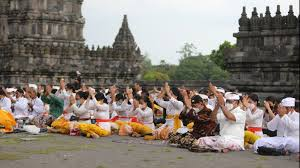Religion in Indonesia - Indonesia is known as a multi-religious country. In this article, we will discuss how important it is to maintain harmony and tolerance in Indonesia. The purpose of writing this article is to provide a deeper understanding of the various religions in this country.
For tourists who want to visit Indonesia and want to learn about religion in Indonesia, here is a complete article that can help.
Indonesia Religion
Indonesia has a long history of religions embraced by its people. Over time, these religions grew and developed in various parts of Indonesia. Religion is a characteristic of Indonesia that makes it different from other countries.
This country highly upholds democratic values and freedom of choice in religion. It's all listed and regulated in the official government law.
In fact, anyone who violates this religious freedom law will be dealt with by the local police. The punishment is also severe.
Indonesia Religion Percentage
Indonesia is a country with a unique diversity of religions. In this article, we will consider the number of religious manifestations in Indonesia and provide a better understanding of the various religions in the country.
Knowing the comparison of the number of adherents of different religions in Indonesia is important to understanding Indonesia's diversity.
A. Islam
Islam is the dominant religion in Indonesia, with a large number of adherents. According to estimates, around 87% of Indonesia's population adheres to Islam.
B. Christian
Christianity is the second largest religion in Indonesia. There are different Christian denominations, such as Protestants and Catholics. About 10% of Indonesians support Christianity.
C. Hinduism
Hinduism is one of the religions practiced in Indonesia, especially in Bali and parts of East Java. The percentage of Hindus is around 1.7% of the total population of Indonesia.
D. Buddhism
Buddhism also has many followers in Indonesia. Buddhist representation is estimated at around 0.7% of the total population of Indonesia.
E. Other Beliefs and Religions
Apart from the major religions above, there are also other traditional minority beliefs and religions in Indonesia. Their appearances are often small, but they still color and vary the religious life in this country.
Methods of Calculation of Presentation of Religion in Indonesia
The calculation of the representation of religion in Indonesia is based on population data and research conducted by the Central Bureau of Statistics (BPS) and the Ministry of Religion.
This data was generated from a questionnaire about the religion of the respondents. It is important to note that these calculations are approximate and may change over time.
Fastest Growing Religion in Indonesia
Indonesia, as a country with a rich diversity of religions, has also witnessed a significant phenomenon of religious growth. In this article, we will reveal the fastest growing religion in Indonesia, as well as the factors that influence this growth. Knowledge of these rapidly growing religions is important for understanding changes in the country's religiously diverse landscape.
The Fastest Growing Religion
A.Islam
Although Islam is the majority religion in Indonesia, several different Islamic groups are experiencing significant growth. For example, groups such as Ahmadiyah and Salafi are emerging with increasing members.
B. Christian
In addition to the main Christian denominations, several smaller Christian denominations, such as evangelical churches and charismatic churches, have experienced rapid growth in several areas.
C. Minority Religions
Several minority religions, such as Sikh, Judaism, and Baha'i, have also experienced an increase in the number of adherents in Indonesia. Although their percentage is still relatively small, this growth reflects changes in Indonesia's religious composition.
Factors Influencing Religious Growth
A. Social and Economic Factors
The growth of certain religions can be influenced by social and economic factors, such as migration, demographic changes, and social class. New religious understandings and practices often appeal to certain groups experiencing social and economic change.
B. Influence of Media and Technology
Developments in technology and social media play an important role in the spread and growth of religion. Social media allows new religions to reach more people and expand their reach of influence.
C. Political and Cultural Context
Changes in the political and cultural context can also affect the growth of religion. Factors such as changing religious policies, the role of charismatic religious leaders, and shifts in social values can affect interest in and participation in a particular religion.
Why is Indonesia Muslim
According to previous data, Indonesia has the right to hold the title of the largest Muslim country in Indonesia. The reasons for this are several:
History of the spread of Islam
Islam first entered India in the 13th century through traders and missionaries from India and the Middle East. The process of spreading religion is done little by little by establishing relations between the state and the people of that country.
Islam accepts and adheres to local customs and traditions, which make it easier for Indonesian people to accept them.
Islamic rule in Indonesia
During the reign of Samudera Pasai, the Sultanate of Aceh, the Sultanate of Demak, and the Sultanate of Mataram, Islam became the religion embraced by the rulers and became an important part of the regional socio-political system.
The government and influence of these Islamic kingdoms played an important role in spreading and strengthening Islam in Indonesia.
The role of religious institutions
Religious institutions such as Islamic boarding schools, Islamic boarding schools and Islamic boarding schools play an important role in the spread and organization of Islam in Indonesia.
These institutions become centers of religious studies, the spread of religious values and the development of social sciences in Muslim societies.
Religion in Indonesia Before Islam
Even though the biggest religion in Indonesia is Islam. But, it is not the first religion to come to this country. Many early religions entered Indonesia, including:
Animism and Dynamism
Prior to the arrival of major religions in Indonesia, society generally adhered to irrational and rigid beliefs.
This belief is based on the idea that everything, including nature and inanimate matter, has a spirit or power that must be respected and dedicated. Ceremonies and worship are held to honor nature and ancestral spirits.
Hindu and Buddhist
Before the spread of Islam, Indonesia had received influences from Hinduism and Buddhism. The Hindu-Buddhist religion was first introduced to Indonesia by Indian traders in the 1st to 5th centuries AD.
In many areas such as Java and Bali, traces of Hinduism and Buddhism can still be seen today. Large temples such as Borobudur and Prambanan are silent witnesses to the development of this religion in the past.
Traditional Religion
Besides Hinduism and Buddhism, other religions also influenced Indonesian society before the spread of Islam.
Some of these religions are traditional tribal religions, such as Sunda Wiwitan in West Java, Kaharingan in Central Kalimantan, and Aluk Todolo in South Sulawesi. Each religion has different practices and beliefs based on local culture. Religion in Indonesia today.
Here is a list of religions practiced by Indonesians today based on federal government data:
- Islam: Is a religion that has many followers in Indonesia.
- Christian: Ranked second for the number of adherents of religions in Indonesia.
- Hinduism and Buddhism: Several religions are still practiced in Indonesia.
- Cultural Beliefs: Although these are the least common beliefs, they still exist because Indonesia strongly supports democratic principles.
Tips for tourists if you want to visit Indonesia
Indonesia is a multi-religious country, where various religions and beliefs are respected and internalized by the people. For tourists visiting Indonesia, it is important to respect and understand these religious differences. In this article, we will provide important tips for tourists to interact with various religions in Indonesia while enjoying their holidays.
Learn about and respect local customs and traditions
Before you go anywhere in Indonesia, take some time to learn about local customs and traditions, including their religious practices.
Learn their culture
Find out about religious events, festivals and ceremonies that may take place during your visit. Maintaining and complying with laws and regulations related to such religious or cultural activities will give the public the respect it deserves.
Well dressed
Indonesia has different customs and fashion standards related to local religion and culture. Make sure you dress appropriately and respect the destination's religious beliefs. When you go to a holy place such as a temple, shrine, or mosque, make sure you wear modest, body-covering clothing, which is considered the norm in the area.
Respect places of Worship
Indonesia has many holy places and important places for religious people. If you are going to a place of worship such as a mosque, church or temple, be polite and respect a quiet atmosphere. If there are specific instructions or rules to follow, follow them wisely.
Respect the food and drink culture
Indonesia has different food and drink traditions related to certain religions and beliefs. If you are invited to eat with local family or friends, try to be open-minded and respect local eating habits. If you have any dietary restrictions or allergies, politely inform the host in advance.
Communicate respectfully
When interacting with local residents, show respect and tolerance for religious differences. Maintain a polite and respectful attitude in every conversation and interaction with local residents. Avoid questioning or criticizing their religious beliefs and get the opportunity to learn about and understand these differences.
Avoid activities that hurt or violate religious beliefs
When traveling, avoid activities that may be considered dangerous or contrary to religious beliefs in Indonesia. For example, avoiding destroying or stealing sacred objects, committing immoral acts in places of worship, or insulting religious symbols.
Ask permission before taking photos or videos
When visiting historical sites, temples or religious ceremonies, always ask permission before taking photos or videos. Some places and events may have rules against photography. Honoring the request shows that you understand and respect the privacy and beliefs of those around you.
Seek social and learning experiences
Use the opportunities in your travels to interact with people from different religious communities. Ask questions with curiosity and share your experiences respectfully. This will increase your understanding of the various religions in Indonesia and help build bridges of cultural understanding.
As a tourist, participate in promoting unity and harmony between people of different religions. Avoid spreading or receiving hate speech, and if you see or hear behavior that violates agreements, report it to law enforcement immediately.
That is an article about Religion in Indonesia. Hope this helps, see you.







Posting Komentar